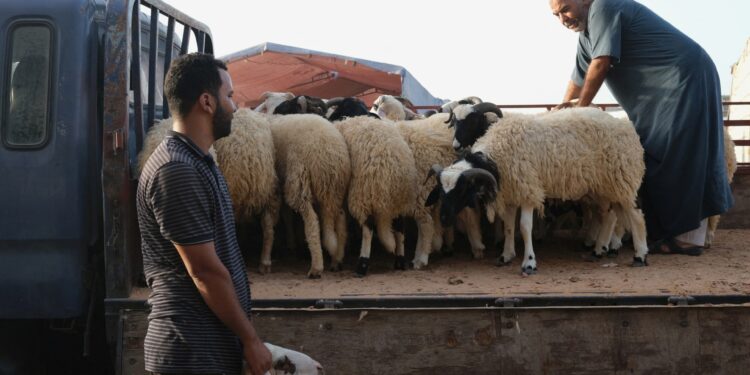The prices of sacrifices in Libya rose sharply, for several reasons, most notably Hurricane Daniel, which struck the city of Derna and caused the loss of a large portion of livestock in the east of the country.
Prices were generally affected by the death of large numbers of sheep, cows, and other animals that residents usually raise as a source of livelihood, according to a Reuters report.
Price jump
The prices of sacrifices imported from Spain and Ukraine, which in the past were popular with people with limited incomes, have almost doubled.
After its price was about 500 Libyan dinars (about 103 dollars), this year it reached 950 dinars.
The efforts of the government emerging from the House of Representatives in the east, allied with retired Major General Khalifa Haftar, did not succeed in easing the burden on citizens. It tried to import sacrifices from abroad, in addition to its efforts to control prices through the Municipal Guard.
Employee Ahmed Abdel Hamid (57 years old), a father of six children, said, “The prices are crazy. It is not reasonable for the price of the sacrifice to reach between 2,000 and 3,700 dinars ($413 to $765). Unfortunately, my salary does not cover this value. I have other obligations from My children’s school fees.”
He regretted his situation, saying, “Life has become difficult. We Libyans are lost, yes, we are lost.”
Imported sacrifices
While some have surrendered to the idea of abandoning the purchase of sacrificial animals this year, others insist on following this Sunnah and practicing this Islamic ritual despite the high prices, such as Abdul Salam Muhammad (46 years old), a taxi driver, who has four children.
Muhammad said while standing in a market for sacrificial animals inside the Al-Kish neighborhood in Benghazi, “Frankly, I came and know the prices, but like every year I will buy the imported sacrifice, knowing that their prices this year are higher than in previous years. They were 500 and 600 dinars ($103.50 and $124.19), and now It became 950 ($196.64).”
He expressed his fears that he would not be able to buy sacrificial animals in the future, and said, “I do not have a salary. I fear that the day will come when I will buy a kilo or two from the butcher on Eid al-Adha for my children.”
The cause of the crisis
Tariq Al-Maghribi, a sheep trader, attributes the current crisis to the high price of fodder and the failure to preserve local livestock.
He says, “The price is high, yes, but what do we do? The state does not support us, the price of feed is high, and this year’s prices are very high.”
He added, “Livestock in Libya has been smuggled to neighboring countries. We do not have a country that cares about this wealth, and they do not talk about sheep except when the Eid comes.”
For his part, the head of the butchers union in Benghazi says: Fawzi Al-Aqouri “One of the reasons for the high prices is the sale of sacrificial animals outside the country and their smuggling…”
Al-Aqouri pointed to the impact of Hurricane Daniel on livestock areas in the east, such as Al-Marj and Takenis, in addition to the rise in the dollar needed to purchase fodder and import livestock.
He added that every Eid, Libyans consume approximately one million and 200 thousand sacrifices.
According to Al-Aqouri, Libya was ranked third in Africa in terms of the size of livestock, but now it has fallen to eighth place.



